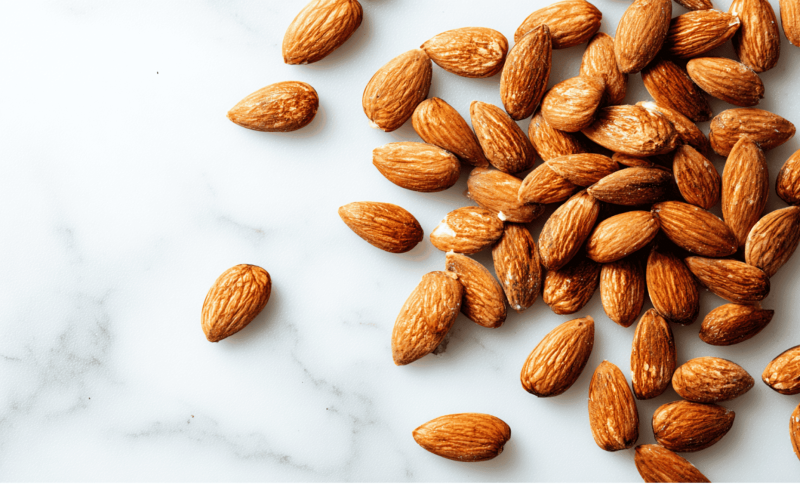Almonds are a favorite snack for many people, enjoyed for their rich flavor and satisfying crunch. They are often added to trail mixes, smoothies, baked goods, or simply eaten by the handful.
Beyond taste, almonds have long been valued as a natural source of energy and nourishment. They contain a mix of healthy fats, plant-based protein, and essential vitamins and minerals that support overall health.
Still, one thing makes almonds stand out: despite their small size, they pack a lot of calories. For anyone interested in diet or nutrition, it’s helpful to know just how many calories almonds provide.
In this blog, we’ll examine the calorie count in various serving sizes of almonds and how these numbers fit into a balanced eating plan.
Why People Ask About Almond Calories
Dry fruits are often seen as a “healthy snack,” but their high energy value can leave people confused. Many wonder how something so small can contain so many calories.
People tracking their weight or following diets like keto, low-carb, or calorie-counting plans usually want exact numbers to stay on track.
Fitness enthusiasts also inquire about almond calories to balance their snacks with their workout goals. Even everyday snackers are curious, since grabbing a handful of almonds feels light but can add up quickly.
Knowing the calorie content helps people enjoy almonds without overeating and allows them to use this nut wisely in their daily routine. Simply put, asking about almond calories is all about making smart, informed choices.
Calorie Count of Almonds by Serving Size
Almonds may look small, but their calorie content varies depending on how much you eat. From a single nut to a full cup, here’s a breakdown of calories in common almond servings.
| Serving Size | Calories (Approx.) |
|---|---|
| 1 almond | 7 kcal |
| 10 almonds | 70 kcal |
| 1 ounce (≈23 almonds) | 164 kcal |
| 100 grams | 579 kcal |
| 1 cup (whole almonds) | 827 kcal |
Note: Calorie values are based on raw, unsalted almonds and may vary slightly depending on brand, size, and preparation method (roasted, salted, or flavored). Always check packaging for the most accurate information.
Why Almond Calorie Counts Can Differ

When looking up almond calories, you might notice different numbers across websites or food labels. This doesn’t mean the data is wrong; various factors can cause slight changes in calorie counts. Here are the main reasons:
- Raw vs. Roasted – Roasting alters moisture levels and may involve the use of oil, which slightly increases the calorie count.
- Salted or flavored almonds – Adding coatings, sugar, or spices increases the total calorie content.
- Serving measurement – A “cup” of almonds can be packed differently, changing the weight and calorie value.
- Almond variety and size – Not all almonds are identical in size or density, resulting in slight variations.
- Food label rounding – Nutrition labels round values, so totals may differ slightly between brands.
Understanding these variations helps you make sense of the numbers you see. Focusing on average values, such as 164 calories per ounce, provides a reliable guide for everyday snacking and portion control.
Nutritional Profile of Almonds: Macros and Key Nutrients
Almonds aren’t just about calories; they’re packed with essential nutrients that make them one of the healthiest nuts you can eat. Here’s a breakdown of the macronutrients and key vitamins and minerals found in a 100g serving.
| Nutrient | Amount per 100g |
|---|---|
| Calories | 579 kcal |
| Protein | 21g |
| Total Fat | 50g |
| Saturated Fat | 3.8g |
| Monounsaturated Fat | 32g |
| Polyunsaturated Fat | 12g |
| Carbohydrates | 22g |
| Dietary Fiber | 13g |
| Total Sugars | 4.4g |
| Calcium | 269mg |
| Iron | 3.7mg |
| Magnesium | 270mg |
| Potassium | 733mg |
| Vitamin E | 26mg |
| Zinc | 3.1mg |
| Copper | 1mg |
| Manganese | 2.2mg |
| Folate | 44µg |
| Cholesterol | 0mg |
| Sodium | 1mg |
Almonds provide a powerful blend of protein, healthy fats, and fiber, along with essential vitamins and minerals.
Adding them to your diet provides energy and essential nutrients, making them a smart snack choice for promoting heart health, bone strength, and overall wellness.
Portion Control Tips for Healthy Weight Management
Almonds are a powerhouse of nutrition, but because they are energy-dense, eating too many at once can work against your weight goals.
Practicing portion control ensures you reap the health benefits without overindulging. A simple trick is to pre-portion almonds into small containers or snack-sized bags, rather than eating directly from a large pack.
Another helpful strategy is mindful eating, which involves slowly chewing and savoring the crunch, helping you feel full with fewer nuts.
Since almonds contain fiber, protein, and healthy fats, they promote satiety, making it easier to manage hunger between meals.
By focusing on moderate servings, you can enjoy almonds daily as part of a balanced diet while still supporting weight management and long-term wellness.
Health Benefits of Almonds Beyond Their Energy Value

Almonds offer far more than just energy; they’re a nutrient-dense snack with multiple advantages for your body.
From supporting heart health to aiding digestion, these small nuts offer long-term wellness benefits when consumed in moderation. Here are some of the most important ones:
1. Heart Health Support
Almonds are rich in monounsaturated fats, which are considered “good fats.” These fats help reduce bad cholesterol (LDL) while maintaining or even raising good cholesterol (HDL).
Along with antioxidants like vitamin E, almonds can support cardiovascular health and may lower the risk of heart disease when eaten regularly as part of a balanced diet.
2. Better Blood Sugar Control
Thanks to their combination of protein, fiber, and healthy fats, almonds help slow the release of sugar into the bloodstream. This makes them especially helpful for people managing blood sugar levels.
Eating almonds alongside carbohydrate-rich foods can help reduce spikes in blood sugar levels, supporting stable energy levels and improved metabolic health.
3. Promotes Satiety and Weight Management
The protein and fiber in almonds create a strong feeling of fullness, which helps reduce unnecessary snacking.
This satiety effect can be a valuable tool for individuals trying to manage their weight, as it makes it easier to stick to planned meals without feeling deprived or hungry between meals.
4. Strengthens Bones and Muscles
Almonds contain calcium, magnesium, and phosphorus, all essential minerals for maintaining strong bones and healthy muscles.
Regular intake can contribute to bone density and reduce the risk of conditions like osteoporosis. Their protein content also supports muscle repair and growth, making almonds a valuable addition to a healthy, active lifestyle.
5. Boosts Skin and Hair Health
Vitamin E and antioxidants in almonds help protect cells from oxidative stress, which can contribute to healthier and more youthful-looking skin.
Their healthy fats also nourish the skin from within, adding a natural shine to hair. Regular consumption may help reduce dryness and promote overall skin elasticity and glow.
Potential Downsides of Eating Too Many Almonds
Almonds are packed with nutrients, but like any food, moderation is key. Eating them in excess can lead to certain drawbacks that affect health and digestion.
Here are some potential side effects of overdoing your almond intake:
- Digestive issues – Consuming high fiber content in large amounts may lead to bloating, constipation, or stomach cramps.
- Excess vitamin E – Consuming too many almonds can increase vitamin E intake to very high levels, which may cause headaches, blurred vision, or blood clotting issues.
- Weight gain risk – Almonds are energy-dense, and frequent overeating may provide more energy than your body needs, making weight management more challenging.
- Reduced mineral absorption – Almonds contain phytic acid, which can limit the absorption of important minerals like iron, zinc, and calcium.
- Possible allergies – For those with nut allergies, even small amounts can trigger reactions such as itching, swelling, or breathing difficulties.
While almonds are one of the healthiest nuts available, portion control is essential.
Being mindful of serving size allows you to enjoy all its benefits without facing these side effects. Balance is the key to making almonds a positive part of your diet.
Almond Calories Compared to Other Nuts
Almonds are often considered one of the healthiest nuts, but how do they compare calorie-wise to other favorites like walnuts or cashews?
Looking at a 100-gram serving makes it easier to understand their place among common nuts.
| Nut | Calories | Protein (g) | Fat (g) | Sat. Fat (g) | Carbs (g) | Fiber (g) |
|---|---|---|---|---|---|---|
| Almonds | 579 | 21 | 50 | 3.8 | 22 | 12.5 |
| Walnuts | 654 | 15 | 65 | 6 | 14 | 6.7 |
| Cashews | 553 | 18 | 44 | 8 | 30 | 3.3 |
| Hazelnuts | 628 | 15 | 61 | 4 | 17 | 10 |
| Macadamia | 718 | 8 | 76 | 12 | 14 | 8.6 |
| Pecans | 691 | 9 | 72 | 6 | 14 | 9.6 |
| Pistachios | 557 | 21 | 44 | 5 | 28 | 10.6 |
| Brazil Nut | 659 | 14 | 67 | 15 | 12 | 7.5 |
| Pine Nut | 673 | 14 | 68 | 4 | 13 | 3.7 |
| Peanut | 567 | 26 | 49 | 8 | 16 | 8.5 |
Note: Calorie values are approximate and may vary depending on the source, nut variety, and preparation method (raw, roasted, or salted). Always check packaging labels for the most accurate nutrition details.
Final Thoughts on Almonds and Their Role in Your Diet
Almonds are more than just a tasty snack; they’re a nutrient-rich food that supports heart health, bone strength, and overall wellness.
While they may be energy-dense, mindful portion control makes them an excellent addition to any balanced eating plan.
From a handful on the go to a topping on meals, almonds provide protein, fiber, and healthy fats that help keep you satisfied and energized.
If you’re managing weight, boosting nutrition, or simply looking for a healthier snack, almonds can easily fit into your lifestyle.
Start adding almonds to your daily routine in smart portions and experience their health benefits for yourself.













